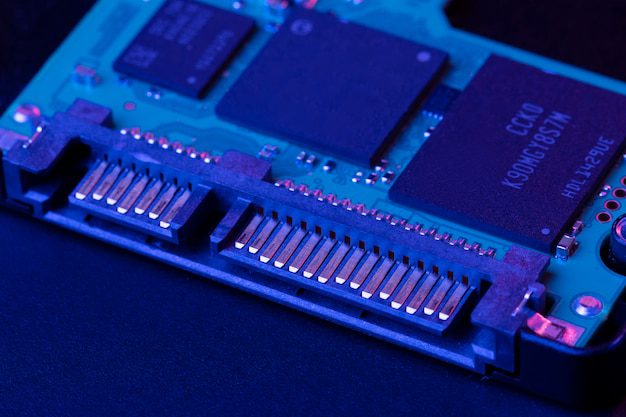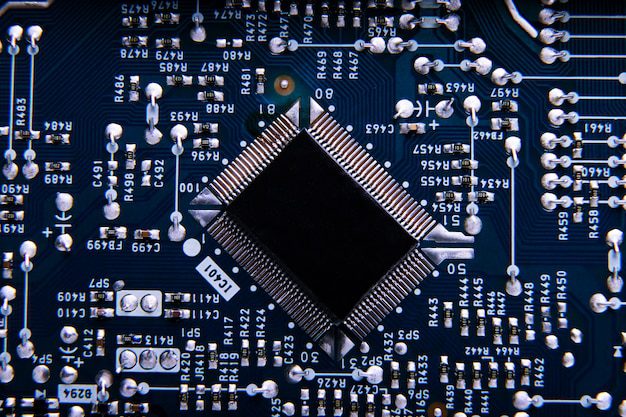Does Apple still use Qualcomm chips?
For years, Apple and Qualcomm were entangled in a bitter legal battle over patents and royalties. However, in 2019, the two tech giants settled their dispute and reached a multi-year agreement, putting an end to their courtroom drama. As part of the settlement, Apple agreed to pay an undisclosed amount to Qualcomm and signed a six-year global patent licensing deal.
So, does Apple still use Qualcomm chips? The answer is yes. Despite their past disagreements, Apple continues to rely on Qualcomm for its modem chips, which are essential for connecting iPhones to cellular networks like 4G and 5G. Qualcomm’s modem technology allows Apple to deliver fast and reliable internet connectivity to its users.
Why does Apple use Qualcomm chips?
Qualcomm’s chips offer several advantages that make them an attractive choice for Apple. Firstly, Qualcomm is a leading provider of modem technology, known for its expertise in this field. Their chips are widely regarded as some of the best in the industry, with a strong track record of performance and reliability.
Additionally, Qualcomm’s chips are compatible with a wide range of networks, including major carriers in the UK. This compatibility ensures that Apple can offer its iPhone users seamless connectivity regardless of their network provider.
Furthermore, Qualcomm’s chips support advanced features like Gigabit LTE and 5G, enabling Apple to deliver faster download and upload speeds to its customers. With the increasing demand for streaming high-definition videos, playing online games, and using data-intensive applications, the need for fast internet connectivity has never been greater.
The impact on consumers
The continued partnership between Apple and Qualcomm has a direct impact on consumers. By using Qualcomm chips in its iPhones, Apple can deliver a better user experience with faster internet speeds and improved network coverage. This is particularly important as 5G networks roll out globally.
“Qualcomm’s modem technology allows for faster download speeds and better network performance, ensuring a seamless experience for iPhone users.”
Additionally, by leveraging Qualcomm’s expertise in modem technology, Apple can focus on other aspects of its devices, such as design, software, and features. This collaboration allows Apple to deliver cutting-edge smartphones while relying on Qualcomm’s proven and reliable modem chips.
In conclusion
Despite their past legal disputes, Apple and Qualcomm have put their differences aside and continue to work together. Apple’s decision to use Qualcomm chips demonstrates the importance of Qualcomm’s modem technology in delivering fast, reliable, and seamless connectivity to iPhone users. As the demand for faster internet speeds and advanced network capabilities grows, the partnership between Apple and Qualcomm remains crucial in providing an exceptional user experience.
Is Qualcomm an Apple Supplier?
In the world of technology, Apple and Qualcomm are two giants that have made significant contributions to the industry. While Apple is known for its iconic iPhone, iPad, and Mac devices, Qualcomm specializes in manufacturing semiconductor chips and other technologies for various electronic devices. So, the question arises: Is Qualcomm an Apple supplier?
Yes, Qualcomm is indeed an Apple supplier. The relationship between Apple and Qualcomm has had its ups and downs over the years. Apple has relied on Qualcomm’s modem chips, which enabled iPhone users to connect to cellular networks. However, in recent years, both companies have been engaged in legal battles and disputes over patents and licensing agreements.
The History of Apple and Qualcomm’s Relationship
In 2016, Apple sued Qualcomm, accusing the company of charging excessive royalties for its patents. This led to a legal battle between the two tech giants, with multiple lawsuits and countersuits being filed. Despite the legal disputes, Apple continued to use Qualcomm’s modem chips in its iPhone lineup, as alternatives were not readily available.
The Shift towards Intel
However, in 2018, Apple started to diversify its suppliers and began using Intel’s modem chips in some of its iPhone models. This move was seen as a strategic step to reduce its dependence on Qualcomm, as well as a result of the ongoing legal battles.
The Settlement and Future Collaboration
Eventually, in 2019, Apple and Qualcomm reached a settlement agreement, dropping all their lawsuits worldwide. As part of the settlement, Apple agreed to pay an undisclosed amount to Qualcomm and entered into a six-year licensing agreement. This led to the companies’ renewed collaboration, with Apple once again using Qualcomm’s modem chips in its latest iPhones.
As of now, Qualcomm remains one of Apple’s key suppliers for modem chips, which are essential for iPhone users to access high-speed internet and cellular networks.
“Qualcomm is a major player in the smartphone industry, and its modem chips have played a crucial role in connecting Apple devices to the world.” – Tech Expert
In conclusion, while Apple and Qualcomm have had their share of legal disputes and disagreements, Qualcomm continues to be a significant supplier for Apple’s modem chips. Their settlement agreement in 2019 resolved their differences and paved the way for future collaboration between the two tech giants.
What is the Apple deal with Qualcomm?
Recently, there has been significant buzz surrounding the Apple deal with Qualcomm. After years of legal battles and disputes over patents and royalties, the two tech giants reached an unexpected settlement in April 2019. This agreement ended all ongoing litigation and included a six-year licensing agreement and a multiyear supply agreement, among other terms.
The Legal Battle
The relationship between Apple and Qualcomm had been tense for several years. Apple accused Qualcomm of using unfair licensing practices and charging excessive royalties for their patented technologies. In response, Qualcomm sued Apple for patent infringement and sought to block the import of iPhones into the United States.
In February 2019, a high-stakes trial began in San Diego, California, with billions of dollars at stake for both companies. However, before the trial concluded, surprising news emerged.
An Unexpected Settlement
“We are glad to put the litigation behind us and focus on innovation,” said Tim Cook, Apple’s CEO.
The unexpected settlement caught many industry experts off guard. The details of the agreement were not immediately released, but it was clear that a resolution had been reached.
Industry analysts speculated that Apple would pay Qualcomm an undisclosed amount as part of the settlement, which would help Apple secure access to Qualcomm’s modem chips. This would potentially allow Apple to incorporate 5G technology into its future iPhones more quickly.
The Implications
The Apple deal with Qualcomm has significant implications for the smartphone industry. With the settlement, Apple gains valuable access to Qualcomm’s leading modem technology, which plays a crucial role in connecting devices to cellular networks.
The deal’s impact extends beyond Apple itself, as other smartphone manufacturers may seek to follow suit and establish agreements with Qualcomm. This development could also have implications for the rollout of 5G technology, as Qualcomm is a major player in developing the necessary infrastructure.
| Supplier | Advantages | Disadvantages |
|---|---|---|
| Intel | Lower cost | Slower development of 5G technology |
| Samsung | Strong technology portfolio | Competitor to Apple in the smartphone market |
Overall, the Apple deal with Qualcomm signifies a turning point in their contentious relationship and has broader implications for the smartphone industry. It remains to be seen how this settlement will impact future iPhone models and the development of 5G technology, but the agreement undoubtedly signals a new chapter for both companies.
What does Qualcomm do for Apple?
Qualcomm is a leading technology company that plays a crucial role in providing various components and services to Apple. Let’s take a look at some areas where Qualcomm contributes to Apple’s success.
1. Cellular Modems:
One of the significant contributions Qualcomm makes to Apple is the supply of cellular modems for iPhones and iPads. These modems enable the devices to connect to cellular networks, ensuring seamless communication and internet connectivity.
2. 5G Technology:
As 5G networks are becoming more prevalent, Qualcomm has been at the forefront of developing and providing 5G modems and technologies. In 2020, Apple introduced its first 5G-compatible iPhone models, which relied on Qualcomm’s expertise and components to deliver high-speed connectivity.
3. Licensing Agreements:
Besides hardware components, Qualcomm and Apple have had a complex history of licensing agreements. In the past, Apple used Qualcomm’s patented technology in its devices and paid royalties for it. However, legal disputes between the two companies resulted in the renegotiation of these agreements and a shift towards Apple using Intel modems briefly.
Fun Fact: In April 2019, Qualcomm and Apple settled their legal battle, reaching a six-year licensing agreement, including a payment from Apple to Qualcomm and a multi-year chip supply deal.
4. Research and Development Collaboration:
Qualcomm and Apple also collaborate on research and development projects, aiming to advance mobile technologies. By working together, they strive to deliver innovative features and enhance the overall user experience for Apple customers.
Conclusion:
Qualcomm’s involvement in Apple’s ecosystem goes beyond mere component supply. From cellular modems to 5G technology and research collaborations, Qualcomm helps Apple stay at the forefront of technological innovation. Their partnership has had a significant impact on Apple’s ability to offer cutting-edge devices and reliable connectivity to its customers.
Do iPhones Have Qualcomm Chips?
When it comes to the internal components of iPhones, there has been a longstanding debate about whether they use Qualcomm chips or not. Let’s delve into this topic and shed some light on the matter.
The Evolution of iPhone Chips
The evolution of iPhone chips is an interesting journey. Initially, iPhones used exclusively Intel chips. However, since 2018, Apple began using a mix of both Qualcomm and Intel chips in their iPhone models. The reason behind this shift was to diversify their supply chain and reduce dependency on a single chip manufacturer.
Qualcomm vs. Intel: The Battle for Supremacy
Qualcomm and Intel are two major players in the global semiconductor industry. Both companies produce cutting-edge chips, but they have different strengths and specialties. Qualcomm chips are known for their superior cellular connectivity capabilities and power efficiency, while Intel chips excel in terms of performance and computing power.
In recent years, Apple has been engaged in legal disputes with Qualcomm over licensing fees and patent infringements. This led to strained relations between the two companies, prompting Apple to explore alternatives, such as sourcing chips from Intel.
The Future of iPhone Chips
In 2020, Apple announced its landmark decision to transition its entire line of iPhones to Apple Silicon chips, effectively ending its reliance on both Qualcomm and Intel. By designing its own chips, Apple aims to have more control over the integration of hardware and software, resulting in improved performance and energy efficiency.
Apple’s shift towards developing its own chips demonstrates its ambition to become more independent in terms of hardware components. This move allows Apple to align its chip development with its overall product strategy.
As a result, future iPhone models will no longer include Qualcomm chips. Instead, they will feature Apple’s own custom-designed chips, such as the powerful A14 Bionic chip found in the latest iPhone 12 lineup.
In conclusion, iPhones have used Qualcomm chips in the past, but going forward, they will be equipped with Apple’s proprietary chips, leaving behind the Qualcomm era and embracing a new chapter of innovation and performance.



